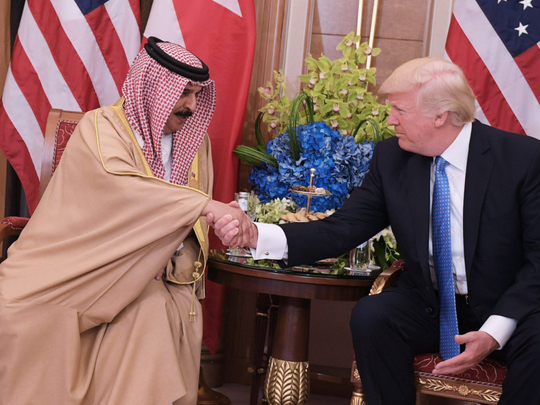
Riyadh: US President Donald Trump said on Sunday Washington’s relations with Bahrain were set to improve, after meeting with the King Hamad Bin Eisa Al Khalifa.
“Our countries have a wonderful relationship together, but there has been a little strain, but there won’t be strain with this administration,” Trump said during a photo session with King Hamad in Riyadh.
“We’re going to have a very, very long-term relationship. I look forward to it very much — many of the same things in common.”
Trump’s White House decided this year to pursue a $5 billion sale to Bahrain of 19 Lockheed Martin F-16 aircraft and related equipment, which was held up last year under the Obama administration. Foreign Minister Shaikh Khalid Bin Ahmad Al Khalifa said last month that Trump better understood the threat to the United States’ Gulf Arab allies from Tehran than his predecessor Barack Obama.
Arab Gulf states pledged in April to fight “terrorism” and “foreign interference” across the region.
In a joint statement following a summit in Riyadh, interior ministers of the six-nation Gulf Cooperation Council said they were determined to prevent “harm to their national unity, the provoking of sectarian tensions and support for terrorist groups”.
The GCC states regularly accuse Iran of interfering in their internal affairs, particularly of stirring unrest in Bahrain and supporting Al Houthi rebels in Yemen.
They said GCC states had shown determination to build bridges of cooperation with other states in the region.
“The biggest challenge facing any state in the modern world is preserving its national unity against foreign and domestic threats,” said Saudi Crown Prince and Interior Minister Mohammad Bin Nayef, who chaired the summit.
The GCC states “continue to face dangerous challenges emanating from Iranian and Iraqi soil”, he said.
The GCC was formed in the wake of Iran’s 1979 revolution and includes Saudi Arabia, Bahrain, the UAE, Oman, Qatar and Kuwait.
Bahrain has been the scene of frequent protests and clashes with police since security forces quelled nationwide anti-government protests in 2011.
Bahrain accuses Iran of fomenting sectarianism in the country and directly supporting militant groups there aimed at carrying out terrorist attacks against the government and security forces.
A report published in the Washington Post in April said western intelligence agencies are seeing a new boldness by Iran in supporting armed insurgents in Bahrain.
Documents and interviews with current and former intelligence officials describe an elaborate training programme, orchestrated by Tehran’s Islamic Revolutionary Guard Corps, to school Bahraini militants in the techniques of advanced bombmaking and guerrilla warfare












